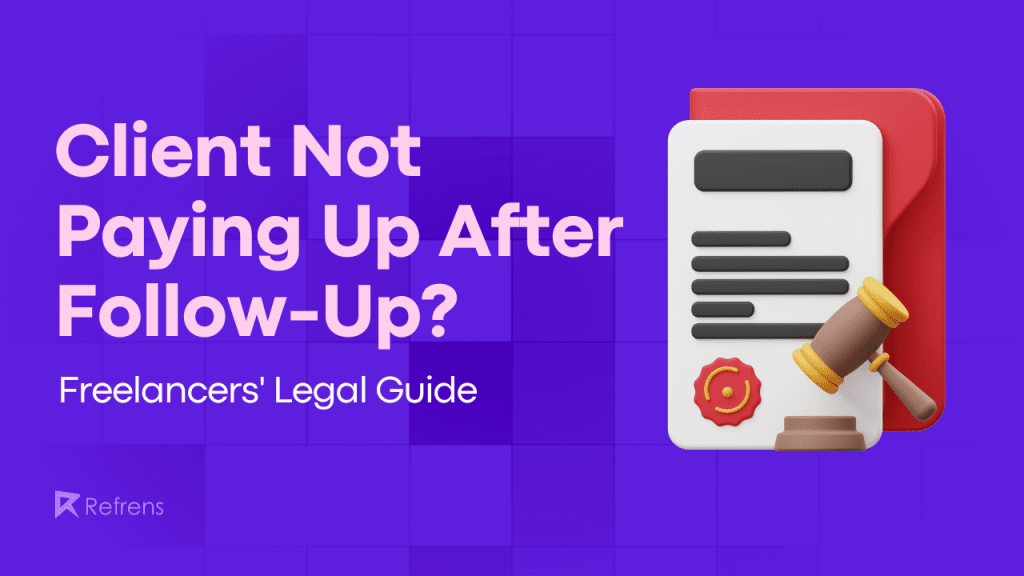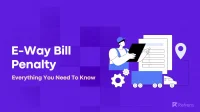Freelancing is attractive to many creatives and professionals in the modern age. The freedom that comes with setting your working hours, pursuing only passion projects, and escaping the confines of a corporate business structure is too compelling for many to pass up.
Thanks to the rise of the gig economy and the increasing accessibility of freelancing websites, services, and mobile applications, around 47% of the global workforce can be considered professional freelancers, with more than 40% of Gen Z professionals reporting freelance work in the last year. Understanding what the gig economy is can help businesses and individuals navigate this growing trend.
Though it’s clear to see why so many workers have become enamored with the potential freedom offered by a freelancing career, there are still many issues with being your boss. Chasing clients and ensuring payment on time can be difficult without a corporate legal team. In fact, 72% of freelancers claim outstanding invoices unpaid by clients. This is a common challenge faced by millennials freelance, highlighting the need for effective invoicing and payment tracking solutions.
For freelancing professionals in such a position, and skilled workers considering a move into the freelancing sphere, this guide will explain how to protect your business from unpaid invoices and bad-faith clients. It will also explain the legal options available to reclaim your missing funds.
A Freelancer’s Guide to Getting Paid
The first step toward nonpayment is to worry about payment. Even though it sounds crazy, sometimes clients do not pay because it is difficult for them. Give your clients as many options (and opportunities) as you can to make sure they pay on time.
1. Assess the situation
First things first, it’s essential that any freelancer knows their client is intentionally withholding payment before any irreversible personal or legal action is taken. Professional freelancers will quickly learn the importance of handling stress through rational thinking. Jumping to conclusions when a single request remains unanswered can lead to ruined working relationships and poor reviews. Learning how to handle stress at work is crucial for maintaining professionalism and making sound decisions.
There are plenty of legitimate reasons why a client may not respond within a day or two. Handling late payments may require time and patience. For example, they may be on vacation or attending to unforeseen personal matters. So, if you’ve not had issues with the client missing payments in the past, it’s usually worth giving them the benefit of the doubt at least once. Knowing what to do when a client doesn’t pay and how to deal with late payment situations can help maintain professionalism and keep working relationships intact.
It’s also worth noting that these situations can often be avoided by agreeing to regular check-ins before work begins. By setting clear working parameters and building trust through weekly or monthly meetings, you’ll know when the client is actually avoiding your communications.
Check out the potential ways to communicate with clients. Developing a strong ability to communicate effectively can help prevent misunderstandings and resolve issues promptly.
2. Re-examine invoices
When assessing whether a client is withholding payment or not, freelancers should look at their billing software. With a clear, well-structured invoice generator, clients can simply click a button or send an email to respond to invoices, so there are fewer chances of the client forgetting to respond.
If the client is still not responding to your invoice request, resend the document as an urgent reminder. You can also attach a short, polite, and professional follow-up email reminding them that their payment is still outstanding. In this way, you will strengthen any potential legal matters by proving that the client had ample time to resolve the issue themselves. Knowing how to write a follow-up email effectively can ensure clear communication and prompt resolution of payment issues.
Check out the best time to send an invoice. Understanding when to send an email can greatly improve the chances of prompt payment and clear communication with your clients.
3. Explore alternative communications
As a final effort to ensure that your client has not simply forgotten to respond to any outstanding payment requests, make sure to open a few lines of alternative communication. Most businesses and independent contractors will have their own Facebook, Twitter, or LinkedIn profiles, so it can be worth sending a short and professional reminder via one of these channels requesting that they get back in touch.
If the client’s reason for not responding is true that they simply forgot to mention a vacation or an urgent personal matter, it may be more likely that they’ll receive a push notification via social media before checking any business-related email accounts, hopefully helping to clear up matters promptly.
4. Contact an attorney
If every available avenue of communication has been thoroughly explored and you still have no response from the client, the matter will need to be addressed as a legal claim. It’s best to contact an attorney and have them draft a demand letter clearly defining the dispute, including an outline of the exact monetary amount that you’re owed, the actions that you’ve already taken, and how you intend to sue for damages.
An attorney will help you to present the matter concisely and formally, including the date of the grievance, all personal and business contact information, an itemized description of all incurred damages, and a clear definition of how you intend to be repaid either voluntarily or through a formal legal process.
A typical demand letter will offer the recipient a timeframe in which they can resolve the dispute before any further legal action will be taken, freelancers should also ensure that the legal consequences for non-payment of invoices are clearly stated, documented, and withheld till they receive the payment.
Check out how to collect faster payments as a freelancer. Learn strategies for how to collect money from a client who won’t pay to ensure you receive timely compensation for your work.
5. Hire a collection agency
As an alternative to legal action, freelancers may wish to consider hiring a collection agency to recover any money owed by clients. Generally, this process will be a little faster than pursuing a legal claim, though some of your reclaimed funds will need to be forfeited as payment for their services.
The collection agency will contact your client and pressure them for payment by outlining the legal repercussions they will face if the dispute is not settled. Typically, this will involve an outline of the court judgment you intend to seek as well as your right to claim damages through additional measures such as garnishment of the client’s wages or a lien placed on the client’s property.
Most collection agencies will only charge if they’re successful in resolving a financial dispute, though freelancers will be required to forfeit around 20%-40% of the recovered funds in the form of payment. Though for some this can be worthwhile as collection agencies have a particularly high success rate.
6. Consider small claims court
If all else fails and your client fails to respond to an official demand letter, your case should be fairly easy to resolve in a small claims court. The financial limit for claims applicable to small claims cases will vary across different states, though typically this value will be set between $2,500 and $10,000.
Provided that you have clear documentation showing that the client has breached your written payment agreement and failed to respond to all communications, a judge will generally award a legal judgment requiring the client to repay withheld funds in their entirety within a determined time frame.
Freelancers will not need to hire an attorney to bring a case to small claims court, and if the client fails to attend court to dispute the claim, the plaintiff will automatically be awarded damages by default.
In India, freelancers can approach the Small Claims Court, which is a division of the District Court, to recover their dues. However, the amount in question should not exceed Rs. 5 lakhs. If the amount is more than Rs. 5 lakh, the freelancer will have to approach the Civil Court. In both cases, the freelancer must provide proof of the work done and the payment agreement with the client.
In the USA, freelancers can file a lawsuit in Small Claims Court if the amount in question is below a certain limit (which varies by state but is generally around $5,000 to $10,000). If the amount is higher, they will have to file a lawsuit in the appropriate state or federal court. Freelancers must provide proof of the work done, the payment agreement, and any other relevant documentation.
In both India and the USA, it is recommended that freelancers have a written contract with their clients, clearly outlining the scope of work, payment terms, and any other relevant details. Including comprehensive freelancer terms and conditions can help in case of disputes and make it easier to recover dues.
7. Protecting against non-payment
As with most professional matters, often the best way to protect against the stress and financial issues associated with non-payment is to develop a thorough vetting and pre-agreement process. By clearly outlining their expectations and offering clients multiple ways to resolve potential problems before they can escalate further, freelancers can often avoid time-consuming and costly legal cases.
Checking the credibility of clients
Learning how to do due diligence before moving forward with potential clients is an essential skill for any freelancer. By taking the time to appropriately vet new clients using several different metrics, you can avoid many of the risks and early warning signs associated with customers acting in bad faith. Developing strong freelancing skills, such as due diligence, can greatly enhance your success and security in the freelancing world.
An effective vetting process will commonly include:
- Asking fellow professionals – Reach out to other freelancers via networking platforms or social media groups to see if the client in question has a reputation within your industry. Building a freelancer support network can provide valuable insights and help you avoid problematic clients.
- Check the client’s social media – If they run their own business, checking for reviews and feedback for clients from their customers can help shed some light on their character.
- Search for news stories – Enter the client’s name (or company name) into a search engine along with keywords like “lawsuit” to see if any legal cases have been brought against them.
- Be wary of “test” work – Freelancers must understand that they are professionals and should be treated as such by clients, and avoid doing free work just to appease a new customer.
Request a deposit
After agreeing to complete a project for a client, and outlining the specifics of the task, freelancers should request a deposit from the client as an act of good faith. Exact deposit amounts will vary depending on the industry and the freelancer’s level of experience, though anywhere between 10%-50% of the final fee is common to cover working costs and time required to complete tasks.
Define deliverables and penalties
Outlining a clear set of expectations and milestones will help to ensure that both freelancers and their clients are able to keep track of active projects. An agreement should be made to pay small amounts of the final fee when a measurable percentage of work has been completed, limiting the impact of any late or missed invoice payments. Penalties for late payment should also be discussed to prevent future payment disputes.

Your work is not free, and neither are you!
For many modern workers with highly developed skill sets and an entrepreneurial spirit, jumping into the active and competitive freelancing market can represent an exciting new challenge as well as the potential for measurable career development. However, running a successful freelancing business takes dedication, perseverance, mental fortitude, and the ability to appropriately vet potential clients. Developing key freelancing skills to learn, such as client vetting and time management, is essential. Understanding how to be a successful freelancer involves continuously honing these skills and adapting to market demands.
To avoid the stress and financial issues associated with missed payments and bad faith customers, freelancers must carefully plan expectations, deliverables, and payment structures with no room for misinterpretation. Meetings should be frequently scheduled, deposits should be discussed, and freelancers should be prepared to pursue missed payments using the legal avenues discussed above.


















